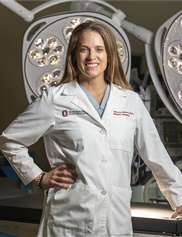Why Choose a Board-Certified Plastic Surgeon
Choose a board-certified plastic surgeon and be confident you are in the care of a highly trained surgeon you can trust.

If you're having plastic surgery, you're probably putting 100% of your focus on choosing your surgeon. But where you have your surgery is as important as who does your surgery. An excellent surgeon is likely to operate in a safe operating room, which means one that has been accredited by a recognized national certifying agency.
How can you tell if it's accredited? Ask to see photos of the OR and look for:
These things are not allowed in an operating room. Why not? Imagine the difficulty cleaning Venetian blinds if fluid gets sprayed. If it's difficult, how often do you think it gets done?
Or if blood or pus spills on the carpet, how is it disinfected between cases?
And that sink? Is the drain really something you want in the same room as your open wound?
How about those baseboards? Fluid spray and bacteria can reside along the seams of where the baseboard meets the walls.
Your surgery should be done in an accredited operating room for one reason: YOUR SAFETY.
There's more to accreditation than the physical characteristics you can see. The other features are invisible to the eye, but they impact patient safety:
Most office surgical facilities are unaccredited, functioning without inspections or peer review. Why would a surgeon operate in a facility that isn't accredited?
One big reason: Patient safety is extremely expensive. It's much, much cheaper to run an unaccredited facility. Don't be fooled by doctors promoting the safety of surgery done under local anesthesia. They may be masking an unaccredited facility and the inability to offer general anesthesia.
If you're planning to have plastic surgery, confirm that your surgeon will be operating in a facility that has been accredited by one of the following nationally recognized agencies:
Minimize your risks by doing your homework well before the day of your surgery. (You don't want to be in a facility without a backup generator if the power goes out!)
The surgeon who operates in an accredited operating room probably cares as much about your safety as you do, and that's comforting to know.
For more information, including a list of ASPS plastic surgeons in your community, please use our Find a Plastic Surgeon tool.
*Originally published on Plastic Surgery Associates of Santa Rosa
The views expressed in this blog are those of the author and do not necessarily reflect the opinions of the American Society of Plastic Surgeons.















